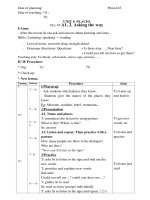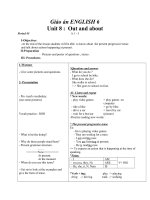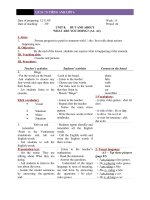Giáo án Tiếng Anh 7 Unit 8: Places
Bạn đang xem bản rút gọn của tài liệu. Xem và tải ngay bản đầy đủ của tài liệu tại đây (152.18 KB, 22 trang )
GIÁO ÁN ENGLISH 7
Unit 8: Places.
Period 46: Lesson 1: A1, A2.
I. Objectives:
- Practice asking and telling the way.
- After the lesson,Ss will be able to tell the ways to a place.
II. Preparation:
- Textbook, tape & cassette
III. Teaching procedure:
1. Organization:
- Date : ................7A:...........
................7B:............
2. Oral test:
- During the lesson.
3. New lesson:
A. Warm- up:
- Introduce the lesson.
B. Presentation:
I. A1:
- Ss look at the pictures in textbook, then name those places.
- Call some Ss to read those places aloud.
- Give feedback.
- T gives the right answers:
a) State/ National bank of Vietnam.
b) Saint Paul hospital.
c) Hotel.
d) The Central Post office.
e) Hanoi Railway Station.
f) Dongxuan market.
- Give some questions:
Are there any similar places in our country ? Name some.
II.A2:
Ss look at the picture and answer these guided questions:
Who are they ?
Where are they ?
What does the tourist want ?
- Ss listen to the tape twice, then practice reading in pairs.
- Call some pairs to read the dialogue aloud.
- Introduce some structures to ask and give the ways:
Could you tell me how to get to ...?
Go straight ahead.
On the right.
Opposite.
- Ask Ss to read the dialogue (b), then find out where the tourist wants to go to.
- Ss find out the other way to ask for the way:
Could you tell me the way to ...?
- Call some pairs to read this dialogue aloud.
4. Consolidation:
- Remind Ss the way to ask to get to a place:
Could you tell me how to get to ...?
Could you tell me the way to ...?
5. Homework:
- Do the Ex in workbook.
Prepare:
Unit 8: Places.
Period 47: Lesson 2: A3.
I. Objectives:
- Further Practice in asking and telling the way.
- After the lesson,Ss will be able to tell the ways to a place.
II. Preparation:
- Textbook.
III. Teaching procedure:
1. Organization:
- Date : ................7A:...........
................7B:............
2. Oral test:
- During the lesson.
3. New lesson:
A. Warm- up:
- Introduce the lesson.
B. Presentation:
* Pre- speaking:
- Ask Ss to do the network:
opposite
between
Prepostions
of place
- Ss give some examples with those prepositions.
* While - speaking:
- Ss resay the ways to ask direction to a place:
Could you tell me how to get to ...?
Could you tell me the way to ...?
- Ss say again the way to give instructions.
- Ask Ss to practice asking and giving instructions to the places given basing on the
map.
Example Exchanges:
S1: Where is the bank ?
S2: The bank is between the hotel and the restaurant. It’s opposite the hospital.
- Ask Ss to practice in pairs.
- Call some pairs to practice aloud.
4. Consolidation:
* Post - speaking:
- Ask Ss to ask the directions to the real places in their local:
the market - the post office - the Auco Temple.
5. Homework:
- Do the Ex in workbook.
Unit 8: Places.
Period 48: Lesson 3: A4, A5.
I. Objectives:
- Practice in asking and telling the distance to get to a place..
- After the lesson,Ss will be able to tell the distance to a place.
II. Preparation:
- Textbook, tape & cassette
III. Teaching procedure:
1. Organization:
- Date : ................7A:...........
................7B:............
2. Oral test:
- During the lesson.
3. New lesson:
A. Warm- up:
- Introduce the lesson.
B. Presentation:
I. A4:
- Present the tasks.
- Ss listen to tape twice, then practice reading the dialogue in pairs.
- Call some pairs to read the dialogue aloud.
II. A5:
- Present the tasks.
- Ask Ss to read these sentences in the dialogue again:
How far ist it from Hanoi ?
I think it’s about 680 km.
How far is it from Hue to Ho Chi Minh City ?
I think it’s abpout 1,030 km.
- Ask Ss to answer these questions:
What are those questions used for ? For asking the distance from a place to
another place.
How can you answer it ?
It’s about ................. m / km.
- T helps Ss revise the ways to ask and answer the distance to a place:
How far is it from + (name of a place) + to + (name of a place) ?
It is (about)............. meters / kilometers.
- T gives an example to make it clear:
Hien Luong / Hanoi / 170 km:
How far is it from Hien Luong to Hanoi ?
It is about 170 kilometers.
- Ask Ss to practice with the places given in texbook in pairs.
- Call some pairs to practice.
4. Consolidation:
- Remind Ss the way to ask and answer the distance to place.
- Give Word Cue Drill:
a. Hien luong/ Viet Tri / 85 km.
b. Hien Luong / Yen Bai City / 18 km.
c. Viet tri / Hanoi / 65 km.
5. Homework:
- Do Ex in workbook.
Unit 8: Places.
Period 49: Lesson 4: B1.
I. Objectives:
- Practice in asking and answering the price of things.
- After the lesson,Ss will be able to ask and answer the price of things.
II. Preparation:
- Textbook, tape & cassette
III. Teaching procedure:
1. Organization:
- Date : ................7A:...........
................7B:............
2. Oral test:
- During the lesson.
3. New lesson:
A. Warm- up:
- Introduce the lesson.
B. Presentation:
* Pre - reading:
- Ss look at the picture of a post office and answer the question:
What are the services of the post office for ?
- sending letter / postcard.
- sending / receiving parcel
- Making long / short distance phone calls.
- selling envelopes / stamps.
- Ss listen to the tape twice.
- T explains some new words:
altogether: tổng cộng /tính gộp lại
change: tiền lẻ
- Ss listen to the again.
* While - reading:
- Ss practice reading the dialogue in pairs.
- Call some pairs to practice reading aloud.
+ New structure:
I’d like to + V .......... .(I would like to + V ......)
I’d like + N
Examples:
I’d like to send a letter.
I’d like some stamps.
+ Structures to ask and answer the price of things:
How much do / does + S + cost ?
Is / are + S ?
It costs .........../ They cost ...........
It is ................./ They are.............
Examples:
How much does this book cost ? It costs 5,000 dong.
How much is this book ?
It is 5,000 dong.
- Ask Ss to read the dialogue again to answer the given questions.
- Give feedback.
- Give the right answers:
a. She will mail her letter to USA.
b. She pays 11,500 dong altogether.
c. She receives 3,500 dong in change.
4. Consolidation:
* Post - reading
- Ss practice asking and answering about the prices of the given things:
a. Those shirts / 350,000dong.
b. That store / 5,400 dong.
c. This scaft / 12,000 dong.
5. Homework:
- Do the Ex in workbook.
Unit 8: Places.
Period 50: Lesson 5: B2.
I. Objectives:
- Practice in vocabulary of post office.
- After the lesson,Ss will be able to make a conversation dialing with the post
office.
II. Preparation:
- Textbook, tape & cassette
III. Teaching procedure:
1. Organization:
- Date : ................7A:...........
................7B:............
2. Oral test:
- During the lesson.
3. New lesson:
A. Warm- up:
- Introduce the lesson.
B. Presentation:
* Pre - reading:
- Set the scene:
You will here a conversation between Nga and Hoa. They are on the way to
the post office. Can you guess what they want ?
- Ss listen to the tape once.
- T explains some new words:
local stamp: tem thư trong nước.
overseas mail: thư quốc tế.
phone card: thẻ điện thoại
- Ss listen to the tape twice again.
* While - reading:
- Ask Ss to read the dialogue silently, then compare with what they have guessed.
- Ask Ss to read the dialogue in pairs.
- Call some pairs to read it aloud.
- Ask Ss to answer the given questions in textbook.
- Give feedback.
- Give the right answers:
a. She needs some local stamps, some stamps for overseas mail and a
phonecard.
b. Because she has a pen pal in America.
c. Because she phones her parents once a week.
- Ask Ss to write down the answers into their notebooks.
4. Consolidation:
* Post - reading:
- Remind Ss the key points in this lesson.
5. Homework:
- Do Ex in workbook.
Unit 8: Places.
Period 51: Lesson 6: B3, B4, B5.
I. Objectives:
- Further Practice in speaking about the price of things.
- After the lesson,Ss will be able to make their own dialogue about the price of
things.
II. Preparation:
- Textbook, tape & cassette
III. Teaching procedure:
1. Organization:
- Date : ................7A:...........
................7B:............
2. Oral test:
- During the lesson.
3. New lesson:
A. Warm- up:
- Introduce the lesson.
B. Presentation:
I A3:
- Set the scene:
You will hear a conversation between Hoa and a post office clerk, but there
is some unfinished information. Now you read and complete the conversation.
- Ss work individually.
- Ss compare their answers with their partners.
- Ss give their answer aloud.
- T corrects and ask Ss to practice reading the dialogue aloud.
II. A4:
- Ss look at the pictures and write the names of things in those.
(pen , envelope , stamps , phone card.)
- Ss guess the price of each thing.
- T introduces:
These are the things which Mrs Robinson will buy. Now you listen and
say the cost of each item as well as the total cost of all those things.
- Ss listen to the tape for three times, then answer the questions:
What is the total cost ?
How much change will Mrs Robinson have from 60,000 dong ?
- Ss listen, then compare their answers with their partners.
- Give feedback.
- Play the tape once again, and pause at each information fopr Ss to check.
- Give the right answers:
The total cost: 59,000 dong including:
A pen: 1,500 dong.
A packet of envelope: 2,000 dong.
A writing pad: 3,000 dong.
Five stamps: 2,500 dong.
A phone card: 50,000 dong.
III. A5:
- Ss practice asking and answering further about the price.
- Ss practice in pairs, then T calls some Ss to practice orally.
- Givesome remarks.
4. Consolidation:
- Remind Ss the key points.
5. Homework:
- Do the Ex in workbook.
Period 52: Ôn tập
I. Objectives:
- Further Practice in all key grammar points.
- After the lesson,Ss will be able to practice fluently all key grammar points.
II. Preparation:
- Textbook.
III. Teaching procedure:
1. Organization:
- Date : ................7A:...........
................7B:............
2. Oral test:
- During the lesson.
3. New lesson:
A. Warm- up:
- Introduce the lesson.
B. Presentation:
I. The Present Simple tense:
- Use: to express the habitual action.
- Form:
I / We / You / They / Plural N + V + O
He / She / It / Singular N + Vs/es + O
- Examples:
I work for that company.
Dogs bark.
He smokes a lot.
She often carries heavy things.
II. The Present Progressive tense:
- Use: For an action happening now.
- Form:
I + am + V-ing + O
He / She / It / Singular N + is + V-ing + O
We / You / They / Plural N + are + V-ing + O.
- Examples:
I am working now.
Nam is watching TV in his room.
Those boys are playing soccer.
III. The comparisons:
1. The comparative:
- Form:
+ with short adjectives:
S + be + adjective-er + than + O
+ with long adjective:
S + be + more + long adjective + than + O.
- Examples:
Nam is taller than Hoa.
This dress is more expensive than that dress.
2. The superlative:
- Form:
+ with short adjectives:
S + be + the + short adjective-est.
+ with long adjectives:
S + be + the most + long adjectives.
+ Execptions:
good - better - the best
bad - worse - the worst
little - less - the least
many - more - the most.
4. Consolidation:
- Remind Ss the key points.
5. Homework:
- Review the key points.
- Prepare the next lesson.
Period 53: Ôn tập
I. Objectives:
- Further Practice in all key grammar points.
- After the lesson,Ss will be able to practice fluently all key grammar points.
II. Preparation:
- Textbook.
III. Teaching procedure:
1. Organization:
- Date : ................7A:...........
................7B:............
2. Oral test:
- During the lesson.
3. New lesson:
A. Warm- up:
- Introduce the lesson.
B. Presentation:
I. The exclaimative:
-
What + a/ an +adj + singular N !
Form :
What + adj + plural N !
- Give some examples to make clear:
What a hot day !
What nice clothes !
II. The prepositions of place:
- Ss list as many preposition as possible.
- Ask Ss to practice with the real things in the classroom.
- Give some exercises for S to practice.
III. The adverbs of frequency:
- Ss list all the adverbs of frequency the have leant:
always
usually
often sometimes seldom
- Ask Ss to present the positions of them:
- before ordinary verbs:
I never go to school late.
She often watches TV late.
never
- after the verb “to be”:
She is always fond of action movies.
I am never fed up with playing computer game.
4. Consolidation:
- Remind Ss all key points.
5. Homework:
- Review all key points to prepare for the Exam.









